- Our Research
- Article
- 6 min. Read
- Last Updated: 04/23/2024
Navigating the New Workforce: Engaging Millennials and Gen Z in the Workplace

Table of Contents
With historically low unemployment rates, attracting and retaining digitally savvy new hires with future leadership potential presents unique challenges. Millennials and Gen Z candidates often fit the bill given their career stage, and significant experience with tech compared to other generations. The key to hiring and retaining the emerging workforce, which increasingly comprises Gen Z and Millennials, is understanding how their needs and preferences intersect with modern human resources (HR) practices.
Our recent study examines how to incorporate innovative HR strategies tailored to meet the evolving demands of the new workforce. From skills-based hiring to fostering and supporting the right talent, our results uncover actionable insights for HR professionals to implement when attracting and retaining the new workforce.
Key Takeaways
- One in five Millennial and Gen Z workers intend to stay at their current job for more than five years.
- On average, Millennial and Gen Z workers need an annual salary of $80,000 to live comfortably.
- 70% of businesses owned by Millennials and Gen Z use a skills-based hiring approach.
- 45% of HR decision-makers find skills-based hiring highly effective in attracting Millennials and Gen Z to their workforce.
Millennial and Gen Z Career Motivations
We asked Millennial and Gen Z workers about their career trajectories, workplace satisfaction, and the factors influencing their decision to stay or leave their current jobs.
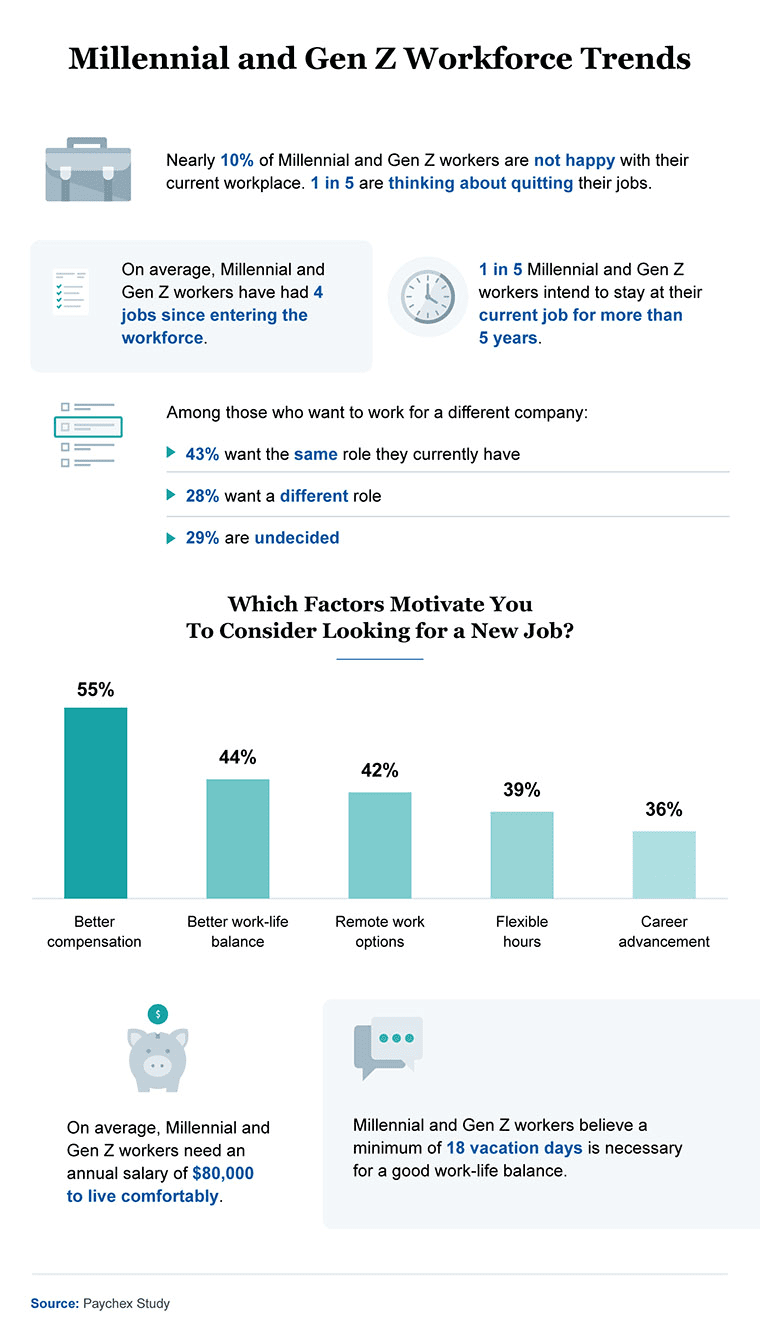
Nearly 50% of Millennial and Gen Z workers surveyed report being extremely happy with their current workplace. Some Millennials and Gen Z intend to stay at their current jobs long-term; 20% plan to stay for over five years, and 12% for their entire careers.
Millennial and Gen Z workers have held an average of four jobs since entering the workforce. But this level of work experience hasn’t always led to a satisfying career. Nearly 10% express dissatisfaction with their current workplaces. Also, one in five are contemplating looking for a new job. Of those considering a change, 43% wish to remain in a similar role (a lateral move) after leaving their current one, 28% would prefer a new role, and 29% are undecided.
Millennials and Gen Z are looking for careers with benefits that align with their lifestyle. The top factor driving them to explore new job opportunities is better compensation (55%). On average, they feel an $80,000 annual salary would help them live comfortably today. Better work-life balance (44%) and remote work opportunities (42%) are other top factors motivating Millennial and Gen Z workers to look for a new job.
Career development opportunities also play a significant role in their job satisfaction and retention. Gen Z and Millennial workers surveyed feel it’s extremely important for their workplace to encourage the following:
- Work-life balance: 85%
- Recognition and respect: 66%
- Autonomy: 64%
- Career growth and development: 64%
- Utilization of individual skills and talents: 63%
- Positive personal and social impact: 50%
In addition, Millennial and Gen Z workers expressed how much they value specific forms of career growth opportunities:
- Opportunities for promotion and advancement within the company: 45%
- Support for professional certification and licensing: 22%
- Support for further education: 20%
This data highlights the need for employers to strategize ways to prioritize meeting the financial and lifestyle expectations of Millennial and Gen Z workers while also fostering an environment that values growth, balance, and appreciation.
To attract and retain Millennial and Gen Z workers, business owners and HR decision-makers could prioritize creating a workplace that offers clear career development opportunities and aligns with their lifestyle expectations. Focusing on structured career pathways with transparent criteria for promotion and advancement could also significantly impact employee retention among these generations.
Supporting professional development through subsidies for certifications, licensing, and further education can also demonstrate a commitment to their employees’ long-term growth. Offering flexible working arrangements, like remote work opportunities and flexible hours, may also address these workers’ desire for better work-life balance. By investing in these areas, businesses can build a more engaged, motivated workforce and foster an environment where newer talent feels valued and understood.
Young Business Owners Weigh In
Millennial and Gen Z business owners are pioneering hiring strategies to attract and retain like-minded talent. Here’s how they’re using social media’s artificial intelligence (AI) capabilities for recruitment, who they’re hiring and why, and what they believe attracts Millennial and Gen Z workers to their businesses.
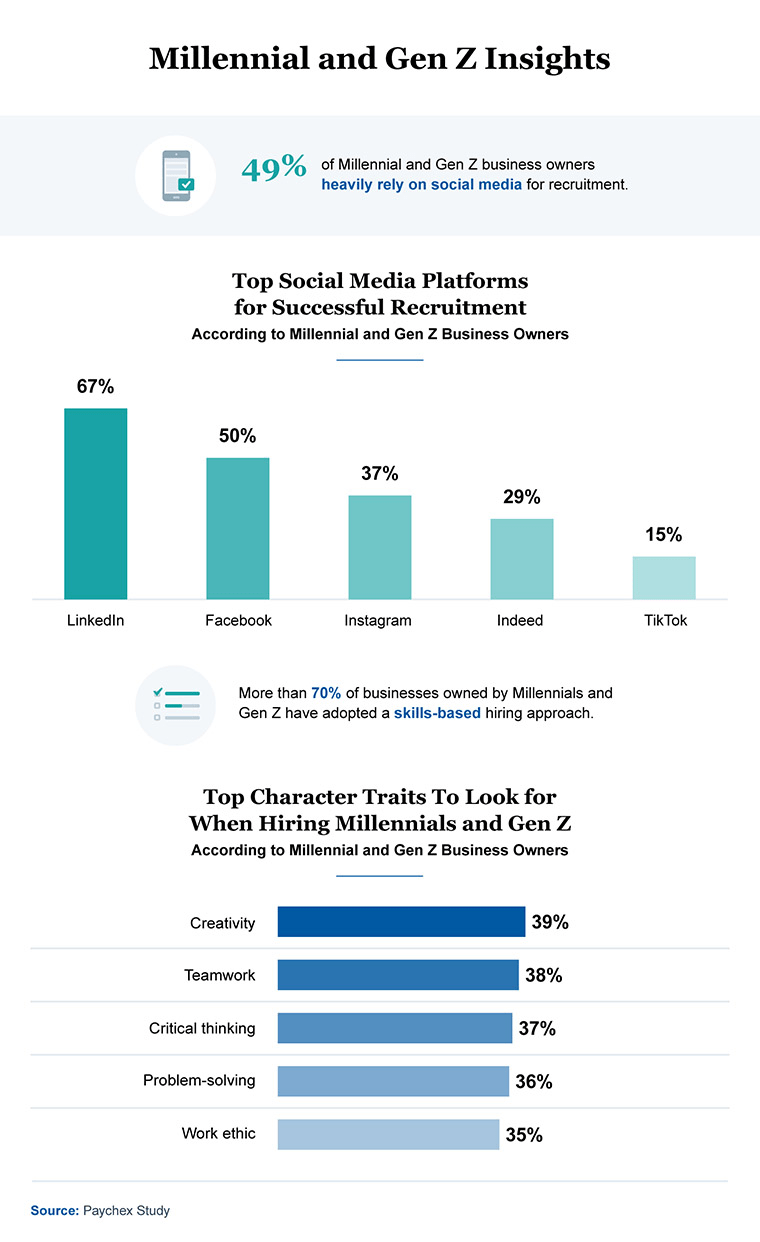
A skills-based hiring model focuses primarily on a candidate’s specific skills and abilities rather than traditional indicators such as degrees, diplomas, or work experience in similar roles. More than 70% of Millennial and Gen Z business owners surveyed use a skills-based hiring approach, valuing capabilities over credentials. Among those not yet using this model, 40% plan to do so within the next year.
The skills-based hiring model enables Millennial and Gen Z business owners to pinpoint candidates who may be the best fit for specific positions by prioritizing practical skills over formal qualifications. This strategy expands the available talent pool by including those with non-traditional backgrounds and emphasizes the potential for upskilling and professional growth within the organization. As a result, businesses become more adaptable and prepared to meet evolving industry demands while fostering a workplace culture that values diversity, inclusivity, and continuous learning.
Just under half of Gen Z and Millennial business owners (44%) are also creating and managing internal talent pools — employees with the skills, potential, and ambition to fill future vacancies or take on new roles within the company. This demonstrates their commitment to nurturing and retaining the talent they’ve already invested in. Talent management software (TMS) streamlines talent management processes throughout the employee lifecycle, including the recruitment process, hiring, onboarding, performance management, learning and professional development, compensation management, and career pathing.
Facing the dual challenges of navigating technological advancements and an aging workforce, hiring Millennial and Gen Z workers has become a strategic move for businesses. These workers often have the skills necessary for today’s digital-first economy and make up an increasingly large portion of the workforce. Many business owners are turning to social media to engage with these workers where they’re active online.
Nearly half of Millennial and Gen Z business owners (49%) rely heavily on social media to reach and recruit potential job candidates. Among these business owners, 67% use LinkedIn, 50% use Facebook, and 37% use Instagram for their prospecting efforts. Some have even turned to TikTok to recruit new employees (15%).
Since Gen Z uses TikTok more than any generation,* this could be a great option for businesses looking to hire these applicants. TikTok’s dynamic and visual nature offers companies a unique opportunity to showcase their culture, values, and the types of roles available in a more engaging and authentic way.
Businesses are using TikTok for recruitment by creating and featuring content like day-in-the-life experiences, behind-the-scenes looks at the workplace, and employee testimonials. This approach provides insight into the company environment and what potential candidates can expect when considering a job at this organization. Companies can also increase their visibility among job seekers by using hashtags and participating in trending challenges.
This strategy can help position companies as an innovative and appealing place to work. It can also help organizations stand out in a competitive job market by connecting with employees in a space where they are already actively engaged.
Depending on the role, Millennial and Gen Z leaders look for specific character traits in potential hires. Characteristics they seek out can include creativity, teamwork, critical thinking, problem-solving, and work ethic. These dynamic and adaptable skills are valuable in today’s workforce because they enable teams to approach challenges with innovative solutions, collaborate effectively, and critically analyze situations for optimal decision-making. This approach aligns with the skills-based hiring model, emphasizing the value of practical abilities over traditional certifications.
We also surveyed Millennial and Gen Z business owners to find out what’s important to them in the workplace. They feel it’s extremely important for their company to encourage the following to attract and retain top talent:
- Work-life balance: 79%
- Career growth and development: 74%
- Utilization of individual skills and talents: 74%
- Recognition and respect: 71%
- A positive impact on others and society: 65%
- Autonomy: 65%
We next wanted to know what they look for when searching for a new job. These are the top three things that make a job post attractive, according to Millennial and Gen Z business owners:
- Flexible working hours and remote work options: 65%
- Competitive salaries: 53%
- Positive company culture and work environment: 41%
These insights highlight the emphasis young business owners place on work flexibility since it’s the number one thing they look for in a job search, and work-life balance is what they want to encourage most in the workplace.
Modern Hiring and Retention Strategies
HR teams are increasingly turning to skills-based hiring and innovative management strategies to attract and retain Millennial and Gen Z talent. We surveyed HR decision-makers from all generations about the effectiveness of these approaches and the actionable steps they’re taking to align with the preferences of the next-generation workforce.
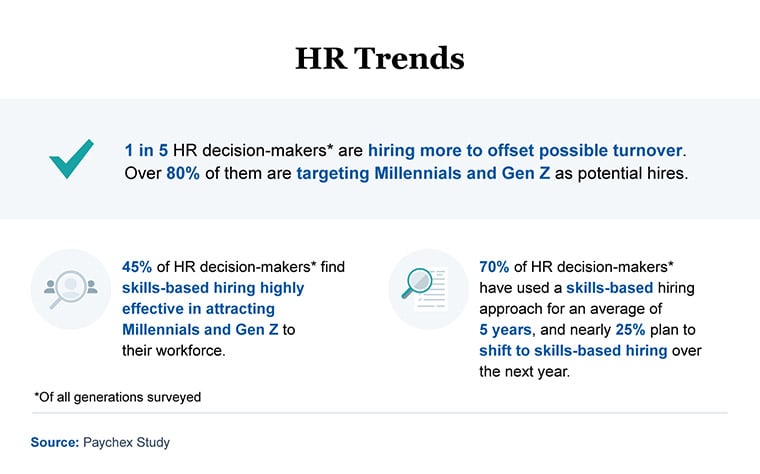
One in five of the HR decision-makers we surveyed are increasing their hiring efforts, with over 80% focusing on Millennials and Gen Z candidates. Many HR decision-makers (70%) prioritize a skills-based hiring approach, and their companies have done so for an average of five years. Nearly half (45%) report skills-based hiring as highly effective in attracting Millennials and Gen Z talent. Nearly a quarter of companies plan to transition to this model in the next year.
HR decision-makers are adopting several key strategies to attract Millennial and Gen Z talent, focusing on promoting a healthy work-life balance (87%), offering competitive salaries (66%), and providing options for remote work (63%). The chart below compares the strategies used by HR decision-makers and Millennial and Gen Z business owners to attract and retain next-generation workers, compared to what these workers find most important in a workplace.
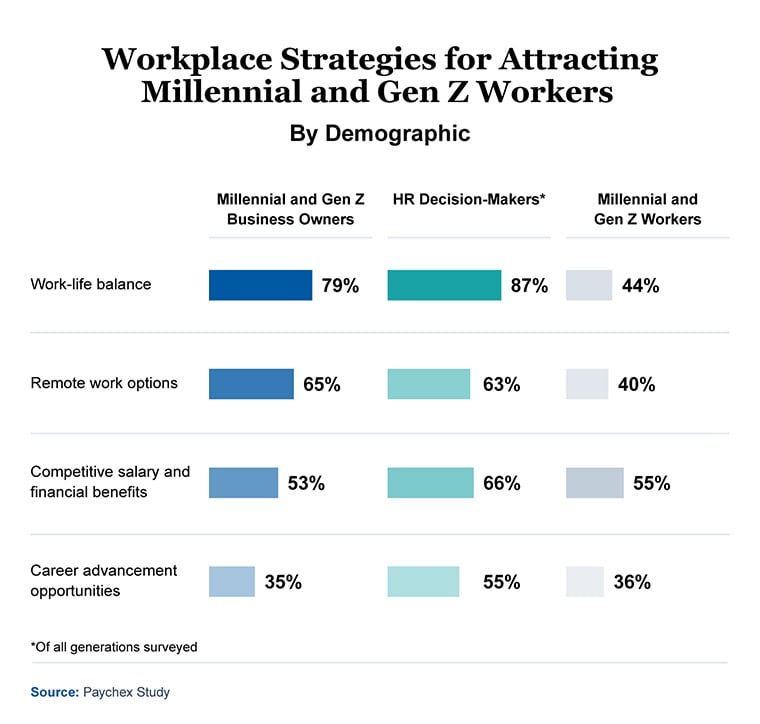
Our comparison shows that while Millennial and Gen Z workers value competitive salaries and other financial benefits the most, business owners and HR decision-makers are focusing the most on promoting work-life balance. These insights suggest those in charge of hiring the next-generation workforce may need to make a shift in their hiring approaches. Next, we turn our attention to what HR decision-makers are doing to retain and manage new employees.
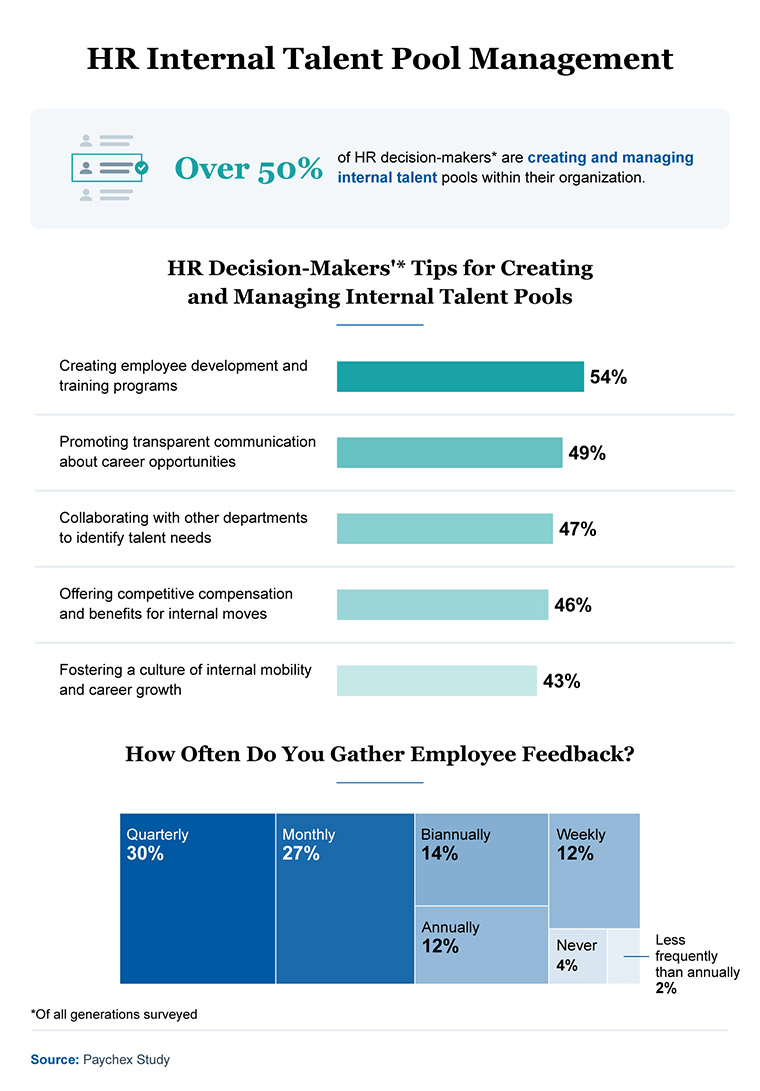
More than half of HR decision-makers are creating and managing internal talent pools within their organization. Some of the top strategies they employ include:
- Creating employee development and training programs to address skills gaps and promote career growth
- Promoting transparent communication about career opportunities to foster a culture of openness and trust
- Coordinating with other departments to identify talent needs to maximize the value of current employees and promote collaboration
To meet Millennial and Gen Z workers’ expectations specifically, HR decision-makers said their companies had implemented remote and flexible work policies (68%), diversity, equity, and inclusion efforts (53%), and more competitive benefits (49%).
Three in five HR department decision-makers also consider continuous employee feedback crucial for enhancing retention strategies. Companies are primarily using this feedback to refine recruitment strategies by adjusting job descriptions (48%), adapting training offerings (47%), and improving interview processes based on employee and candidate feedback (43%). HR decision-makers most often collect this feedback quarterly. However, this timeframe can vary based on specific organizational needs and culture.
Their talent management efforts are paying off in terms of employee retention, with nearly 70% of HR decision-makers observing positive impacts on retention within their organizations after employing strategies like these. Creating and managing internal talent pools can facilitate agile staffing and foster a culture of internal mobility, enabling employees to explore diverse roles and grow within the organization.
Future-Proofing Your Workforce
With the workplace rapidly evolving, understanding and aligning with the needs of Millennial and Gen Z talent is more important than ever for businesses looking to thrive. Businesses must take proactive steps to bridge the gap between what Millennial and Gen Z workers seek and what employers are currently offering. Based on our findings, they should consider adopting skills-based hiring and innovative recruitment strategies such as leveraging social media.
Using platforms like TikTok allows businesses to meet these workers where they are, showcasing their company culture and values in a relatable and engaging way. Focusing their hiring efforts on offering competitive salaries, better work-life balance, and clear paths for career advancement is also vital to attracting Millennial and Gen Z workers. Businesses that adapt to these changing workforce dynamics will be better able to attract and retain the talent necessary for future success.
Methodology
Paychex surveyed 760 Millennial and Gen Z workers, 194 HR decision-makers, and 200 Millennial and Gen Z business owners on January 30, 2024, to explore the evolving workplace demands of Millennials and Gen Z.
The average age of Millennial and Gen Z workers was 35; 51% were male, 48% were female, and 1% were nonbinary. The generational representation was 79% Millennials and 21% Gen Z. The average age of HR decision-makers was 37; 53% were male, and 47% were female. The generational representation was 3% baby boomers, 23% Gen X, 57% Millennial, and 17% Gen Z. The average age of Millennial and Gen Z business owners was 31; 50% were male, and 50% were female. Their generational representation was 68% Millennials and 32% Gen Z.
About Paychex
Paychex is a leading provider of integrated human capital management software solutions for human resources, employee benefits, insurance services, and payroll. Discover how we can support your business at Paychex.com.
Fair Use Statement
Feel free to share the insights from this article with anyone interested in the evolving dynamics of the workforce, especially regarding the integration of Millennials and Gen Z. You may use our findings for educational and non-commercial purposes, but please provide a link back to this page to ensure readers have access to the full study.
For questions or media inquiries please contact skjean@paychex.com.
Tags







